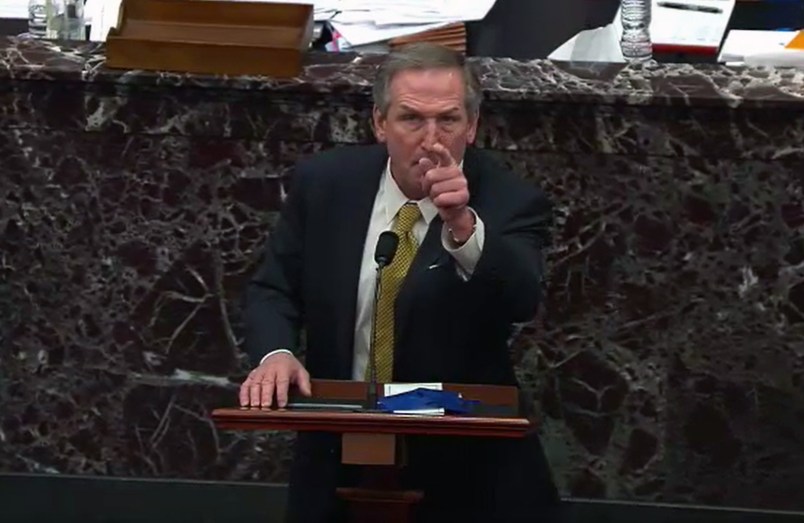To make the case for his conviction, the House impeachment managers argued that former President Trump has shown no remorse for driving his supporters to violence with his claims that the election was stolen. The defense Trump’s attorney put forward proved that he sees nothing wrong with how he poisoned the minds of his base.
Repeatedly, to defend Trump’s actions, the Trump team embraced and elevated aspects of the so-called “big lie” of a stolen election that Trump had injected into his supporters’ worldview.
There was no acknowledgement that the claims that Trump was pushing had no basis in reality. Instead, the Trump team validated his insidious election fraud allegations to justify the actions he took to reverse the result.
This validation was present in how the Trump team tried to reframe the Jan. 6 speech that he gave his supporters ahead of the Capitol riot.
Attorney Michael van der Veen’s pushed back on the idea that with the speech, Trump was encouraging his supporters to disrupt the certification of the Electoral College vote. But van der Veen’s counter-explanation still rested on the idea that the results were illegitimate and Trump wanted them overturned — what Trump wanted was them overturned through an Electoral College vote count challenge in Congress.
“Not only president’s speech on January 6th, but indeed his entire challenge to the election results, was squarely focused on how the proper civic process could address any concerns through established legal and constitutional system,” van der Veen said.
To explain Trump’s plea to the rallygoers that get “their people to fight,” Trump attorney Bruce Castor argued that Trump was referring to hope that his supporters would primary the Republican politicians who didn’t go along with his election reversal campaign. Again, that favorable interpretation of the speech still centered around Trump’s demand that Republicans overturn Biden’s election win.
Trump’s lawyers drew upon the “big lie” again when trying to defend Trump’s call with Georgia Secretary of State Brad Raffensperger. They suggested that House managers had misled the Senate by being too literal in their account of Trump’s request that Raffensperger “find” votes in the Georgia election results. Their defense of Trump’s request was: Trump wasn’t asking for Raffensperger to find the specific votes that would make him the winner. Trump, in their telling, was asking Raffensperfger to find thousands of ballots that Trump claimed had been invalidly cast.
Castor cited favorably two conspiracy theories about Georgia’s election results to justify that Trump demand. One “concern” Trump was focused on, Castor said, was that the ballot rejection rate in the 2020 general election was lower than in previous election.
A top Georgia election official tweeted a debunker to that theory, calling it “disinformation.”
OK…piecing this together. The initial absentee rejection rate for signature issue was about double in 2020 as 2018. There is a cure period now and the final rate was 0.15% in both years. So…shockingly, the disinformation continues…
— Gabriel Sterling (@GabrielSterling) February 12, 2021
The second reason was asking for ballots to be found, according to Castor, was because there may have been forged signatures. Again, this is a baseless claim, and one that Trump putting forward as a pretext for getting the election overturned.
After playing footsie with the big lie, a question during the question period forced the Trump team to confront it dead on. Sen. Bernie Sanders (I-VT) asked both sides if Trump won the election.
Van der Veen refused to answer the question, calling it “irrelevant.”







Indeed, Goebbels would be proud.
So…their entire presentation is based on a lie and when the Dems try to bring it back to the central premise that the PRESIDENT OF THE UNITED STATES urged, incited, petted and told his followers to go to the Capitol and ‘take it back’ is irrelevant? Huh.
This is straight-up Might.
Trump’s Might.
JFC!!! JFC!!! Lies, and the Lying Liars Who Tell Them!!!
Mein Drumpf.